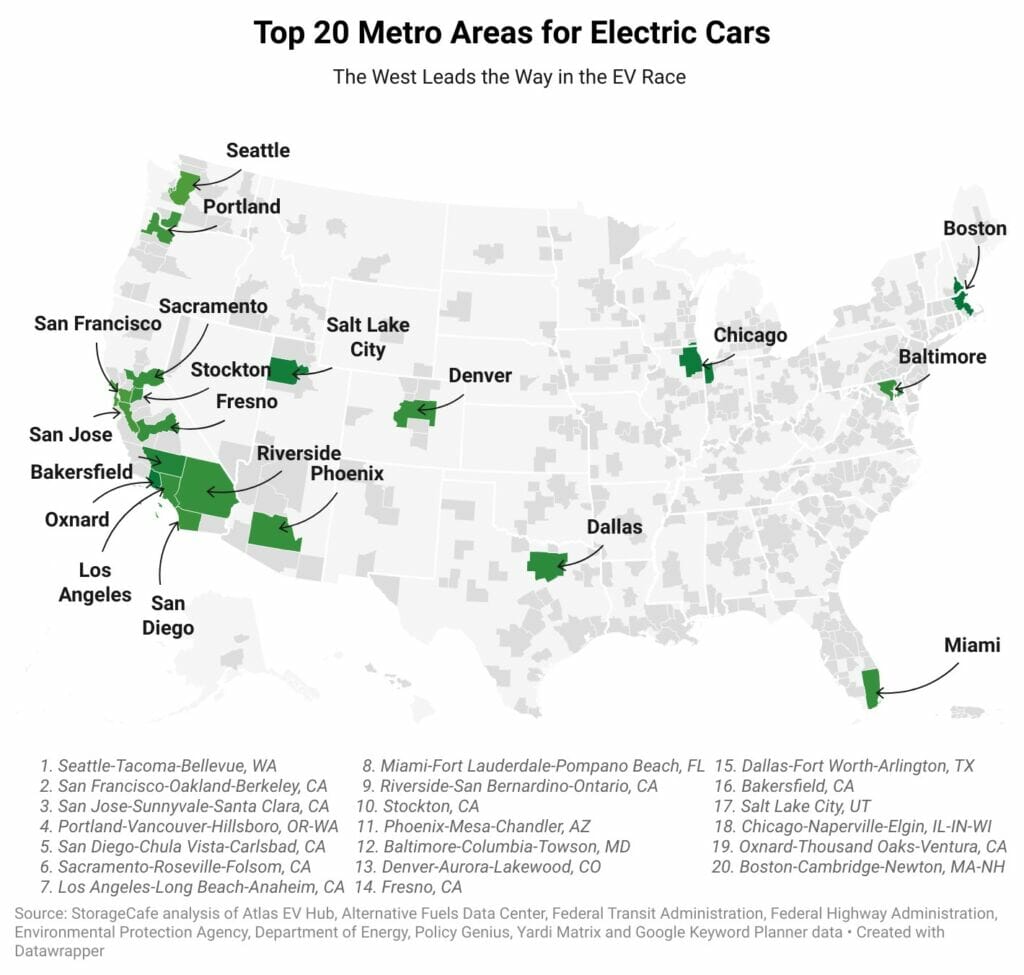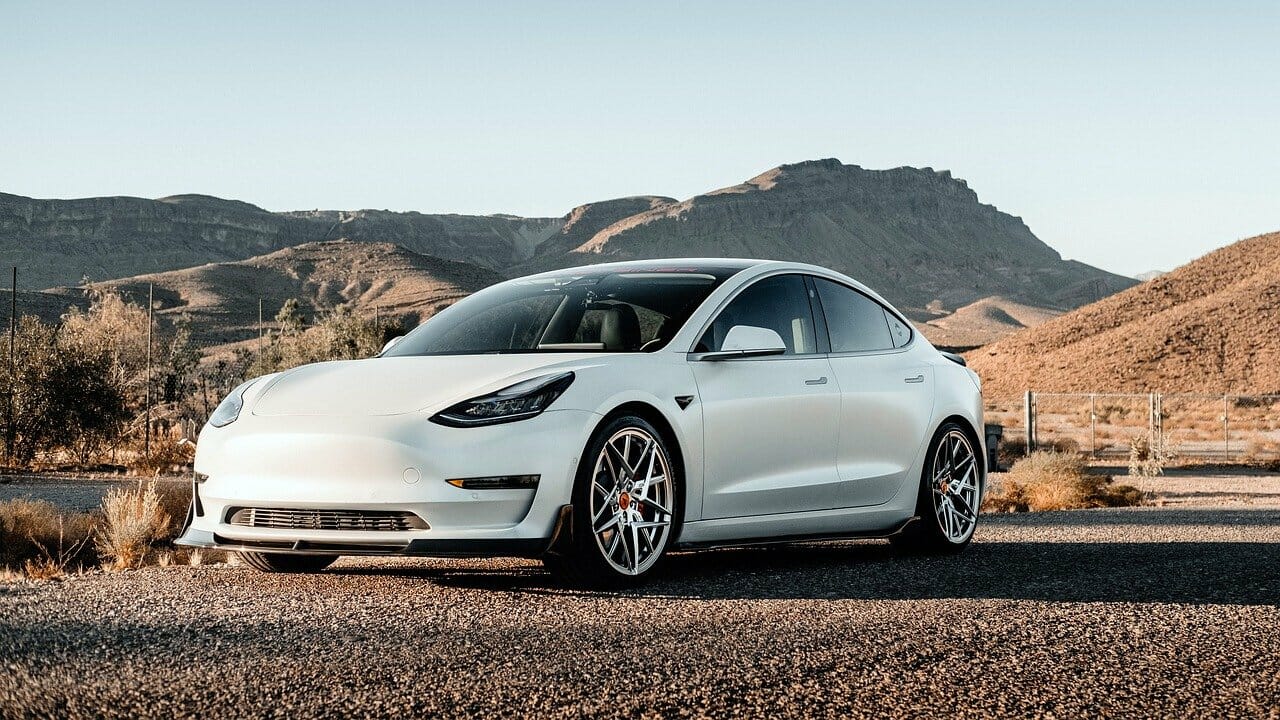The electric car movement has taken off in the past few years, but in 2022 it grew by leaps and bounds. Electric car sales of 800,000 were recorded in 2022, 65% more than in 2021. Add to the mix lower prices, a continuously improving infrastructure and you have the perfect recipe for electric cars slowly entering mainstream adoption. So, what are the best cities for electric cars?
DEEPER DIVE: Could Pinal County become the Detroit of electric vehicles?
In the context of electric cars becoming more commonplace, some metro areas seem better equipped than others to embrace the EV movement. To find out which places are the most EV-friendly, StorageCafe put together a report ranking the largest metropolitan areas in this respect. They took into account the number of registered EVs, EV-chargers (public and in rental buildings), highway friendliness, public transportation using clean fuel, condition of roads, renewable energy, insurance and eGallon (equivalent of gas gallon) costs, local incentives and vehicle storage options. Based on the report’s findings, the best cities for electric cars are located in the West with Miami, FL, the only outsider in the top 10.

Phoenix enters the electric race in the 11th spot
In the heated EV race, the Phoenix metro area is just one position shy of the top 10 best cities for electric cars thanks to an overall environment that helps the EV movement to grow. Over 38K EVs are registered in the metro area, which translates to 2 electric cars per 100 households. The local infrastructure is also growing, in an effort to accommodate the local charging needs. When you account for population, Phoenix has about 0.4 public charging stations per 1,000 households. Moreover, charging options extend to almost 6% of the apartment complexes in the metro area, an impressive 27% more than in 2020. That means over 497K apartments have access to this amenity currently. Cost-wise, an eGallon goes for $1.1 in Phoenix and insuring your EV here costs $182/month. Also, if you ever need to put your vehicle in storage when you’re not using it, a Phoenix storage unit rents for $171/month.
Phoenix seems to not only have a considerate number of EVs but also the right conditions for them to get out on the roads. Out of the 2,200+ lane miles of highway, about 390 of them are dedicated to HOV (high-occupancy vehicle) lanes which also allow EV drivers to use them. Overall, HOV lanes make up 17.5% of the metro area’s lane mileage, the highest share in the country. Besides privately-owned vehicles, the electric movement extends to public transportation, with 63% of the network running on clean fuel. The natural environment also seems to be supportive of EVs, with temperatures dipping below 50 degrees during about 2.2% of the year. To contextualize, car batteries are more likely to function at full capacity in a warmer climate.
California dominates the list of best cities for electric cars
As a West Coast metro area that’s committed to supporting green living, Seattle is the best metro area for electric cars, thanks to the number of EVs, infrastructure, incentives and other factors that create the right place for electric vehicles to thrive. In total, there are 47K+ electric cars or about 3 of them per 100 households. As far as charging infrastructure goes, the Seattle metro area has a total of 1,000 public charging stations, whether they’re located at grocery stores, restaurants, hotels, golf courses or other public places. Moreover, over 7% of rental buildings come with EV-charging stations, which means that over 490K apartments in Seattle have access to this amenity.
Seattle’s highways have more than 1,740 lane miles in total, with HOV lanes making up 10.5% of the mileage. Beyond private drivers, the EV movement is encouraged by the public transit here. Over 73% of public transit runs on clean fuel. Additionally, half of the area’s electricity is sourced from renewables.
With over 105K EVs, San Francisco emerges as another great place for electric cars. When you account for population, the San Francisco metro area has about 6 EVs per 100 households. The infrastructure is well-developed too to accommodate the large number of electric cars cruising the metro area. In total, there are over 2,400 public chargers or 1.4 of them per 1,000 households. Besides public options, 6.3% of apartment buildings also come with EV-charging stations, providing this amenity to over 378K apartments.
Getting out and about with your EV in San Francisco is a lot easier thanks to HOV lanes – they make up almost 15% of San Francisco’s lane mileage or about 290 dedicated lane miles. Moreover, a staggering 93% of public transit uses clean fuel, an indication of the local pledge to reduce the carbon footprint.
San Jose also grabs a spot on the podium among the best places for electric cars, as it provides the right environment for the EV movement to thrive. This Californian metro area boasts over 44K electric vehicles, which boils down to 6.6 EVs per 100 households. San Jose also fares well in terms of charging infrastructure. In fact, it comes first for charging stations by population distribution (2.2 public charging stations/1,000 households). Overall, the metro area has about 1,490 public charging stations. With electric cars becoming a more widely desired commodity, over 10% of rental buildings also offer charging stations for EV-owning renters. Over 200K apartments in the San Jose metro area benefit from this feature.
With California leading the way in the EV race, it’s no surprise to see Los Angeles pop up among the best places to own an electric car. In fact, Los Angeles comes first nationally for the number of electric cars, as the metro area registers about 293K in total. When you consider population distribution, LA has 6.6 EVs per 100 households. The impressive number of EVs means that charging needs are equally demanding. As it turns out, LA shines in this respect too, with close to 4,780 public chargers in total. That number comes down to 1.1 chargers per 1,000 households.
Driving your EV in LA is a lot easier thanks to the highway system supporting this type of vehicle. About 14.5% of the metro area’s lane mileage is dedicated to HOV lanes, totaling 800 lane miles. Moreover, EV support extends well beyond private drivers, with close to 80% of the public transit in LA running on clean fuel. This contributes to a better air quality in the area.
Representing Oregon, Portland also shines brightly for its EV scene. It is actually one spot shy of the podium for EV performance overall, and it boasts about 30K electric cars. When you factor in the population, Portland has 2.8 EVs per 100 households. The charging infrastructure boasts a total of 470 public charging stations or 0.5 of them per 1,000 households. About 6% of rental complexes are outfitted with EV-charging stations, a feature that’s much appreciated by renters who also own an electric car. Besides private drivers, electrification also extends to the public sector, with close to the entire public transit system (98%) running on clean fuel. This speaks to Portland’s pledge to create a better and cleaner environment for its residents.
Miami is the only Southern metro area to crack the top 10 Sitting in the good company of several Western metro areas, Miami, FL, is the only Southern place to grab a spot in the top 10 metro areas for electric cars. Boasting about 36K EVs, Miami seems like a place that is vested in helping the EV movement grow. It’s clear that the local infrastructure also accommodates EV ownership, with about 850 public charging stations available here. This feature is also available to some renters – about 4.6% of apartment buildings offer access to charging stations in 2021, 18% more than the previous year. All in all, renters in 637K apartments are granted access to this type of amenity in Miami




